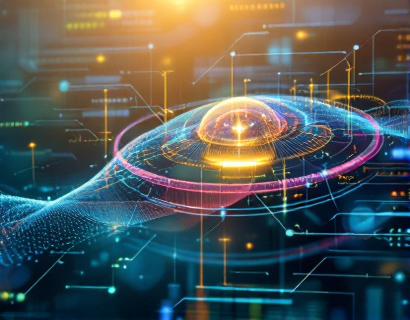Harnessing AI and Crypto: Elevating Digital Experiences for Modern Users
The intersection of artificial intelligence and cryptocurrency is paving the way for a new era of digital experiences. This fusion is not just about combining two cutting-edge technologies but about creating a synergy that redefines how users interact with digital platforms and applications. For tech enthusiasts and innovators, this convergence offers a wealth of opportunities to enhance user experiences, streamline processes, and unlock new possibilities in the realm of connected technologies.
The integration of AI and crypto is transforming the way we approach digital security, personalization, and efficiency. AI algorithms can analyze vast amounts of data to identify patterns and predict user behavior, while blockchain technology ensures secure and transparent transactions. Together, they create a powerful toolkit for developers and businesses aiming to deliver superior digital experiences.
Enhancing Security Through AI and Crypto
One of the most significant benefits of merging AI with cryptocurrency is the enhancement of security measures. Traditional security protocols often fall short in the face of sophisticated cyber threats. AI-driven solutions can detect and respond to anomalies in real-time, providing a dynamic and adaptive security layer. For instance, machine learning models can analyze transaction patterns to identify potential fraud, ensuring that users' digital assets remain safe.
Blockchain technology, inherently secure due to its decentralized nature, can be further fortified with AI. Smart contracts, which are self-executing contracts with the terms directly written into code, can incorporate AI to automate and enforce contractual obligations more effectively. This not only reduces the risk of human error but also enhances the overall trust and reliability of digital transactions.
Personalized User Experiences
AI's ability to process and analyze large datasets makes it an ideal companion for personalizing user experiences. In the context of cryptocurrency and digital services, AI can tailor recommendations, notifications, and interfaces based on individual user preferences and behaviors. For example, a digital wallet app powered by AI can learn a user's spending habits and suggest optimal times for transactions to minimize fees or maximize rewards.
Moreover, AI-driven chatbots and virtual assistants can provide 24/7 customer support, answering queries and resolving issues promptly. These AI-powered tools can understand natural language, making interactions more intuitive and user-friendly. By leveraging natural language processing and sentiment analysis, these assistants can adapt their responses to better suit the user's emotional state and context.
Optimizing Network Performance
The performance of blockchain networks is crucial for widespread adoption. AI can play a pivotal role in optimizing network operations, ensuring smooth and efficient transactions. Machine learning algorithms can predict network congestion and adjust parameters in real-time to maintain optimal performance. This proactive approach helps in reducing transaction times and lowering fees, making cryptocurrency more accessible and user-friendly.
Additionally, AI can enhance the scalability of blockchain networks by identifying bottlenecks and suggesting improvements. For instance, AI-driven solutions can optimize the consensus mechanisms used by different blockchain platforms, balancing security, speed, and decentralization. This not only improves the user experience but also fosters greater adoption of blockchain technology across various industries.
Innovative Financial Products and Services
The combination of AI and cryptocurrency is giving rise to innovative financial products and services that were previously unimaginable. AI algorithms can analyze market data to identify trends and opportunities, enabling the creation of sophisticated trading bots and robo-advisors. These tools can execute trades with precision and speed, offering users the potential for higher returns with reduced risk.
Furthermore, AI can facilitate the development of decentralized finance (DeFi) applications that are more user-friendly and accessible. By automating complex financial processes and providing intuitive interfaces, AI-powered DeFi platforms can democratize access to financial services, empowering users to manage their assets more effectively.
Enhancing Supply Chain Transparency
Beyond financial applications, the integration of AI and cryptocurrency is revolutionizing supply chain management. Blockchain technology ensures transparency and traceability, while AI can analyze supply chain data to optimize logistics and reduce costs. For instance, AI can predict demand fluctuations, optimize inventory levels, and identify potential disruptions, enabling businesses to respond proactively.
Cryptocurrency can facilitate seamless and secure transactions within the supply chain, reducing the need for intermediaries and lowering transaction costs. Smart contracts can automate payment processes based on predefined conditions, ensuring that all parties are held accountable and transactions are executed efficiently. This not only enhances the overall efficiency of supply chains but also builds trust among stakeholders.
Future of Connected Technologies
The synergy between AI and cryptocurrency is set to drive the future of connected technologies in numerous ways. As the Internet of Things (IoT) continues to expand, the need for secure, efficient, and personalized interactions becomes paramount. AI can process the vast amounts of data generated by IoT devices, while blockchain ensures the integrity and privacy of this data.
Moreover, the emergence of decentralized autonomous organizations (DAOs) is another area where AI and crypto intersect. DAOs leverage blockchain for governance and decision-making, with AI enhancing the analytical capabilities of these organizations. This combination can lead to more democratic and efficient management of digital assets and projects, fostering innovation and collaboration.
Challenges and Considerations
While the potential benefits are significant, there are challenges that need to be addressed. One of the primary concerns is the regulatory landscape, which is still evolving in both AI and cryptocurrency domains. Ensuring compliance with regulations while innovating is crucial for the sustainable growth of these technologies. Additionally, there is a need for greater public education and awareness to build trust and adoption.
Technical challenges, such as interoperability between different blockchain platforms and AI systems, also need to be overcome. Standardization and collaboration among developers and organizations are essential to create a seamless and integrated ecosystem. Furthermore, ethical considerations, particularly around data privacy and algorithmic bias, must be prioritized to ensure responsible use of these technologies.
Conclusion
The fusion of AI and cryptocurrency is not just a technological trend but a transformative force that is reshaping the digital landscape. By enhancing security, personalizing user experiences, optimizing network performance, and enabling innovative financial products, this synergy is opening new frontiers for tech enthusiasts and innovators. As we move forward, the continued exploration and development of these technologies will undoubtedly lead to even more exciting advancements, paving the way for a more connected and intelligent future.











































